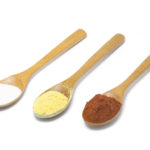By David Blyweiss, M.D., Advanced Natural Wellness
February 23, 2018
- Get rid of those “senior moments” for good
- Here’s what this exotic spice can do for your brain
- How to get the most power from your supplement
Don’t you just hate it when you experience a “senior moment”? It’s so embarrassing when you walk up to a coworker and suddenly can’t remember their name… or lose your glasses only to find out they’re sitting on top of your head.
Well, if you need a memory boost, I may have just the thing for you.
It’s an exotic Indian spice that can improve your memory by up to 28%. Not only that, but it also helps clear out amyloid plaques, tau, heavy metals and other brain “gunk” that contribute to age-related memory loss.
In other words, it offers powerful protection against most of today’s most common causes of mental deterioration!
Here’s what this Exotic Spice can do for Your Brain
Turmeric, the spice used to make curry, is loaded with a powerful antioxidant called curcumin that can help you put the brakes on memory failure. (It’s this compound that may explain why the people of India experience relatively low rates of dementia compared to the U.S.)
Not surprisingly, people who eat the most curry have better mental scores and cognitive function than those who eat the least.
But what happens when you get a large dose of curcumin every single day?
Well, this is where the big news comes in.
It turns out taking just 90 milligrams of curcumin twice a day for 18 months can improve your memory function by a whopping 28%! It also improves mood and attention span.
But that’s not all.
Are You Suffering From...
- Love handles and a pot belly
- Romance that isn't what it used to
- Forgetfulness and inattention
- Low (or no) strength and endurance
- A sex drive that's shifted into neutral...or worse
If so...you may have Mature Male Burnout. Click here to discover more about this unique condition and what you can do about it.
- Daily curcumin intake reduces the accumulation of amyloid and tau in two brain regions – the amygdala and hypothalamus. These two regions control memory, emotions and decision-making processes that are necessary for day-to-day living.
- Curcumin increases the bioavailability of vascular nitric oxide. This is a compound that relaxes your blood vessels and improves arterial function. This, in turn, increases blood flow to all of your organs… including your brain.
- Animal studies find that curcumin also increases something called brain-derived neurotrophic factor, or BDNF. This protein encourages the growth of new neurons and enhances synaptic activity, so your brain can make the right connections more easily and readily. Increased BDNF levels are believed to delay or reverse memory loss, improve brain function and perhaps even make you smarter.
Choosing the Best Curcumin for Your Brain
Unfortunately, there is a problem with curcumin that many health-conscious people are unaware of. It has relatively low bioavailability. For example, even a large 2 gram dose of curcumin may not be detected in your blood serum.
Thankfully, there’s a very simple way around this problem.
It turns out that when you mix curcumin with just a small amount of black pepper, it can increase it’s bioavailability by a whopping 2000%. Now that’s really putting the power of curcumin to good use for you!
That’s why I recommend looking for a curcumin supplement that also includes bioperine, a black pepper extract that substantially increases its bioavailability. The formula should also be standardized to 90 to 95 percent total curcuminoids.
If you would like to find out what other benefits you can get from a daily dose of curcumin, check out this special report for all the details.
SOURCES:
Ng TP, et al. Curry consumption and cognitive function in the elderly. Am J Epidemiol. 2006 Nov 1;164(9):898-906.
Small GW, et al. Memory and Brain Amyloid and Tau Effects of a Bioavailable Form of Curcumin in Non-Demented Adults: A Double-Blind, Placebo-Controlled 18-Month Trial. The American Journal of Geriatric Psychiatry, 2017. Online Ahead of Print.
Santos-Parker JR, et al. Curcumin supplementation improves vascular endothelial function in healthy middle-aged and older adults by increasing nitric oxide bioavailability and reducing oxidative stress. Aging (Albany NY). 2017 Jan; 9(1): 187–205.
Franco-Robles E, et al. Effects of curcumin on brain-derived neurotrophic factor levels and oxidative damage in obesity and diabetes. Appl Physiol Nutr Metab. 2014 Feb;39(2):211-8.
Shoba G, et al. Influence of piperine on the pharmacokinetics of curcumin in animals and human volunteers. Planta Med. 1998 May;64(4):353-6.







